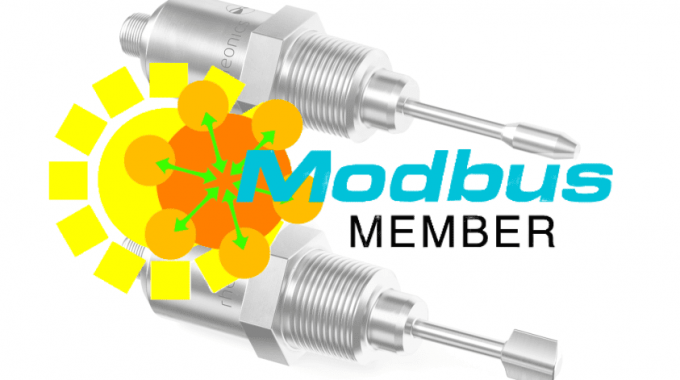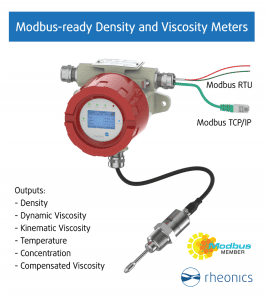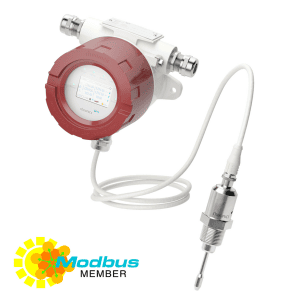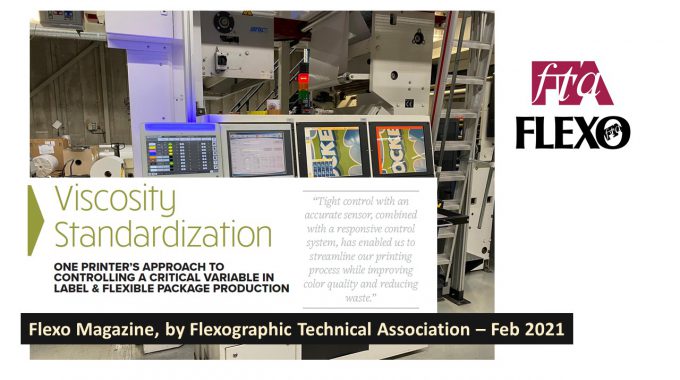
Modbus Organization partnership with Rheonics
Rheonics is a member of the Modbus Organization as a vendor of hardware, software, and Modbus-compatible systems.
The Modbus Organization is a group of independent users and suppliers of automation devices that seeks to drive the adoption of the Modbus communication protocol suite and the evolution to address architectures for distributed automation systems across multiple market segments. The Modbus Organization will also provide the infrastructure to obtain and share information about the protocols, their application and certification to simplify implementation by users resulting in reduced costs.
Modbus RTU and Modbus TCP/IP are available on Rheonics density meters and viscometers over a 2-wire RS-485 interface and Ethernet port.

Rheonics Membership
Rheonics is a member of the Modbus organization as a vendor of hardware, software, and Modbus-compatible systems.
Rheonics provides detailed user manuals and technical support for integration. Our Modbus-compatible sensors can be easily integrated into Modbus networks thanks to all the guidelines and steps provided in our support portal. In addition, our experienced engineering team can assist with installation and configuration to ensure successful integration into your Modbus network on time. Visit our Support portal for more information on Modbus Protocol: Modbus RTU (RS-485) and Modbus TCP (Ethernet).

In multiple automation applications, Modbus plays a pivotal role by ensuring smooth communication between an array of field devices and the central control system, with a special emphasis on its integration with PLCs.
Rheonics SME with Modbus communication facilitates remote access to comprehensive device diagnostics and configurations, resulting in swift decision-making, reduced downtime, and an overall enhancement of system efficiency.
The Modbus Protocol, conceived by Modicon in 1979, serves as a messaging framework facilitating client-server communication among intelligent devices. Widely acknowledged as a de facto standard, it stands as an openly accessible network protocol extensively adopted in the industrial manufacturing realm. Implemented by numerous vendors across a myriad of devices, it enables the seamless transfer of discrete/analog I/O and register data among control devices.
We also offer advanced calculation models for compensated viscosity, compensated density, and concentration which can be transmitted over Modbus along with the line measurements. Learn how you can get °API, °Baume, compensated viscosity, and density using the onboard MATHS engine > Measurements
How does this partnership benefit your process?
When evaluating network options for your device, both Modbus TCP/IP and Modbus RTU provide distinct advantages:
Simplicity: Modbus TCP/IP straightforwardly integrates the Modbus instruction set with TCP/IP, offering ease of access. If you are already familiar with Modbus drivers and have a grasp of Ethernet and TCP/IP sockets, setting up a driver and establishing communication with a PC can be achieved within a few hours. Development costs are minimal, requiring only basic hardware, and the process is uncomplicated across various operating systems. On the other hand, Modbus RTU is a serial communication protocol that utilizes a compact binary representation, simplifying implementation over RS-232 or RS-485 interfaces and only requires 2 wires.
Standard Ethernet (Modbus TCP/IP): Modbus TCP/IP eliminates the need for specialized chipsets, allowing the use of standard PC Ethernet cards for communication with your newly integrated device.
Openness: Both Modbus TCP/IP and Modbus RTU underline a commitment to openness. The Modbus protocol’s transition from Schneider Electric to the Modbus Organization in April 2004 emphasized this commitment. The specifications are freely available for download, and there are no subsequent licensing fees for using Modbus or Modbus TCP/IP protocols.
Device Availability (Modbus TCP/IP and Modbus RTU): Widespread interoperability among devices from different vendors and compatibility with a large installed base of Modbus-compatible devices make both Modbus TCP/IP and Modbus RTU excellent and versatile choices for various applications. While Modbus TCP/IP is suitable for Ethernet-based networks, Modbus RTU is often used in industrial settings over serial communication interfaces such as RS-232 or RS-485. The flexibility to choose between these protocols allows for effective communication in diverse environments.
How does the Modbus protocol work?
Modbus communication occurs over serial lines connecting devices. A basic configuration involves a single serial or Ethernet cable linking the serial ports of two devices: a Client and a Server.
The data is transmitted in the form of bits, representing a sequence of ones and zeroes. Each bit is conveyed as a voltage, with zeroes transmitted as positive voltages and ones as negative. The transmission of these bits is rapid, with a common speed being 9600 baud, indicating the number of bits transmitted per second.
In Standard Modbus, information is organized and stored within the Server device using four distinct tables. These tables are designed to accommodate different types of data – two for on/off discrete values (coils) and two for numerical values (registers). Importantly, each of these tables comprises both a read-only section and a read-write section.
Rheonics Expertise
A few typical applications where our customers are using Modbus protocol are:
- Transmission of density (weight) of drilling mud over Modbus.
- The viscosity of batter mix that is applied to various appetizer food products.
- Plywood glue manufacturing and application – measure and transmit viscosity and temperature of glue.
- Measure and transmit viscosity in the process for water-based ink.
- Measure and transmit the density, viscosity, and temperature of ceramic slurry from the slurry drum to the PLC and SCADA system in shell rooms.
- Monitoring and transmission of density, viscosity, and temperature to SCADA system over Modbus in Processing plants for food production as well as in the beverage industry and dairies
- Automation and control for water/wastewater treatment uses PLC with Modbus communication to get sewage water density and viscosity for nitrification, polyelectrolyte, and calamity detection.
- and many more.
Resources
- Modbus RTU (RS-485)
- Modbus TCP (Ethernet)
- Modbus TCP integration with BR X20/Sensor Connection to PLC
- Modbus TCP/IP Integration with Micro820
References
- The Modbus Organization
- What is Modbus and How does it work? | Schneider Electric USA
- Rheonics Integration to PLC » rheonics :: viscometer and density meter
- EtherNet/IP: The standard protocol for communication in industrial networks » rheonics :: viscometer and density meter
- HART partnership between FieldComm Group and Rheonics » rheonics :: viscometer and density meter


